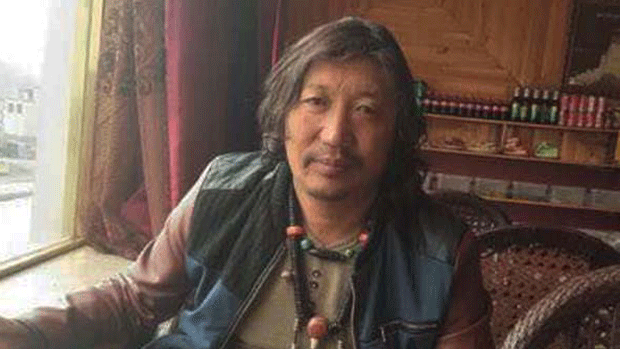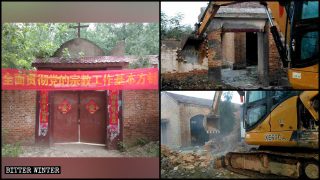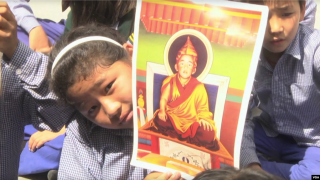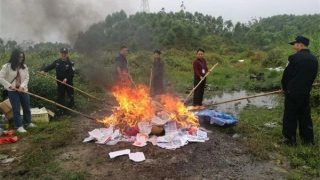
A campaign launched two years ago by Chinese authorities in Tibet to combat crime is also targeting political dissidents, critics of corruption, and activists promoting use of the Tibetan language, Human Rights Watch said in a report on Friday.
Also drawing attention from the police are Tibetan supporters of exiled spiritual leader the Dalai Lama, who is viewed by Beijing as a dangerous separatist intent on splitting the formerly independent Himalayan country away from Chinese rule, HRW said.
Launched in January 2018, China’s drive against so-called “underworld forces” was officially aimed at combating drug dealing, gambling, and other gang-related crimes, HRW said in its report, “China: Tibet Anti-Crime Campaign Silences Dissent.”
Since then, though, courts in Tibetan areas of China have used “gang crime” charges “to sentence at least 51 Tibetans up to 9 years in prison for peacefully petitioning or protesting issues related to religion, environmental protection, land rights, and official corruption,” HRW said.
Recent reports in Chinese state media meanwhile reveal that local authorities have now been ordered to use the anti-crime drive to crush support for greater freedom in Tibet, especially if critics of Chinese government policy in Tibet “can be seen as a group, as spokespeople, or as supporting the Dalai Lama,” HRW said.
A directive issued by the Tibet Autonomous Region’s (TAR) Public Security Bureau also now bans Tibetan religious figures or other “locally respected figures” from mediating local disputes, an activity not previously considered by authorities to be illegal, HRW said.
Also targeted by the campaign are attempts by Tibetan activists to protect Tibet’s environment from damage caused by Chinese mining or other infrastructure projects, efforts described by officials as an “illegal occupation [by the protesters] of land.”
China’s anti-crime campaign in Tibet “is just another way to prevent Tibetans from exercising their internationally guaranteed rights,” HRW’s China Director Sophie Richardson told RFA’s Tibetan Service this week.
“The Chinese government has long sought to criminalize any criticism raised [against it], particularly by Tibetans,” Richardson said.
A coordinated, global response to Beijing is now needed to change the ruling Chinese Communist Party’s behavior toward Tibetans, Uyghurs, and human rights defenders in China, Richardson said, adding that “China is now also flexing its muscles within the UN system in ways that threaten UN human rights mechanisms.”
“Therefore, governments around the world need to [launch] a coordinated campaign now to make pushback a priority,” Richardson said.
“This campaign goes beyond the CCP’s regular guidelines and gives additional authority to Chinese local officials, police, and [political] leaders to detain and harass Tibetans accused of suspicious activity,” added Wangden Kyap, a senior researcher at London-based Tibet Watch.
‘It’s just an excuse to crack down’
“It’s just an excuse to crack down on Tibetans,” Kyap said, adding that the campaign has traumatized Tibetan communities and sown mistrust among Tibetans afraid of being reported by informers to the Chinese authorities.
Under China’s anti-crime campaign, restrictions on religious freedoms have also “increasingly escalated, especially under the leadership of China’s president Xi Jinping,” added Tenzin Tsetan, a research fellow at the Dharamsala, India-based Tibet Policy Institute.
“This can be viewed as a systematic Sinicization of Tibetan Buddhism, which along with the Dalai Lama is perceived by China’s Communist Party as a potential threat to its authority,” Tsetan said. “Therefore, the CCP has put this campaign into effect.”
Examples previously reported by RFA point to abuses carried out by authorities in the TAR and other Tibetan areas of China under the name of fighting crime.
In December 2019, Anya Sengdra—a resident of Gade (in Chinese, Gande) county in Qinghai’s Golog (Guoluo) Tibetan Autonomous Prefecture was sentenced to a seven-year prison term on a charge of disturbing social order after he complained online about corrupt officials, illegal mining, and the hunting of protected wildlife.
“[His] arrest and conviction fits a wider pattern of harassment of Tibetan activists and environmental defenders, which has seen hundreds of arrests,” London-based Free Tibet said, adding that roundups by Chinese police are now being conducted as part of a crackdown on so-called “criminal gangs.”
Development projects in Tibetan areas have led to frequent standoffs with Tibetans who accuse Chinese firms and local officials of pilfering money, improperly seizing land, and disrupting the lives of local people.
Many result in violent suppression, the detention of protest organizers, and intense pressure on the local population to comply with the government’s wishes.
Reported by RFA’s Tibetan Service. Translated by Tenzin Dickyi. Written in English by Richard Finney.
Source: Copyright © 1998-2016, RFA. Used with the permission of Radio Free Asia, 2025 M St. NW, Suite 300, Washington DC 20036. https://www.rfa.org.



